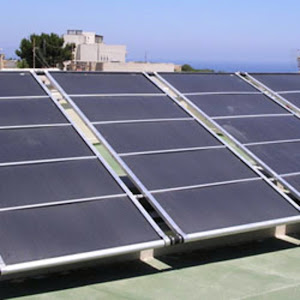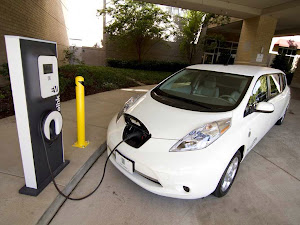Several years ago, Tony Seba, an energy expert from Stanford University, published a book called Solar Trillions, predicting how solar technologies would redefine the world’s energy markets and create an investment opportunity worth tens of trillions of dollars.
Most people looked at him, he says, as if he had three heads. That was possibly because the book was written before the recent plunge in the cost of solar modules had taken effect, and before most incumbent utilities had woken up to the fact that solar – even with minor penetration levels – was turning their business models upside down.
Seba is now working on a new book, with even more dramatic forecasts than his first. His new prediction is that by 2030, solar will make the fossil fuel industry more or less redundant. Even more striking is his forecast that electric vehicles will do the same thing to the oil industry by around the same date.
The predictions are made on the basis that the cost of solar and EV batteries will continue to fall, while the cost to consumers of sourcing energy from fossil fuels through the grid or liquid fuels will continue to rise. Before the decade is out, Seba says, both technologies will pass a tipping point that will eventually sweep the incumbents aside, just as technology and cost developments have done in the computer, internet, media, photographic and telecommunications industries.
“I am incredibly optimistic that by 2030, nuclear, coal, gas, big hydro, and oil will be all but obsolete,” Seba toldRenewEconomy in an interview in San Francisco last month. “The world will be mostly powered by solar and wind, and most new vehicles will be electric. The architecture of energy markets is going from centralized to distributed – in liquids and the electric market.”
The working title for the book is “Disrupting energy – how Silicon Valley is making coal, nuclear, oil and gas obsolete.” It is pinned on the theme that decentralised generation and storage will replace the centralised, hub and spoke model that has prevailed for the last century. The impact of decentralised generation is already being felt. The striking part of Seba’s prediction is the speed with which it will happen.
First, on the technology cost issue. For EVs, Seba says the success of Tesla – in sales and in reputation – has changed the conversation around EVs, particularly after it won the 2013 Car of the Year award.
“Basically, EVs were supposed to be expensive and underpowered and weak and 50 years away. Tesla showed all that was wrong. The EV will do to oil what solar will do to coal, nuclear and gas. EVs are a disruptive technology, there is no doubt about that.
“The propaganda says that it is too expensive and has little range. But if you look at the cost curve of batteries, even Detroit is saying that by 2020 lithium-ion batteries will be at $US200/kWh.
“The tipping point for the mass market to move from internal combustion engines to EVs is between $US250 and $US300/kWh. Once it gets to $US100/kWh, it is all over. I think we will get to $US250/kWh by 2020. By 2030, when batteries are at $100/kWh, gasoline vehicles will be obsolete. Not on their way out, obsolete.” Seba thinks that mass migration will start around 2018 to 2020.
On solar it is a similar story. “When I wrote my first book, a lot of people looked at me like I had three heads,” Seba says. “They thought I was way too optimistic because the conversation then was about grid parity for solar in 2060, or 2070.
“And what you hear is the same thing we heard 20 years ago, that this is not going to happen, that it is difficult, that power needs specialised scale, that it can only be done like this. When in fact, over the last few years, a country like Germany has pioneered the move from a few dozen central power plants to more than a million producers.
“Australia has done the same thing. Bangladesh has a million solar installations. So the poorest people in one of the poorest countries are adopting solar unsubsidised. Solar is already cheaper than grid – what people are paying for electricity – in dozens of countries already. And that is despite huge fossil fuel subsidies.
“The sun is more democratic than any other source of energy. Coal is in pockets, gas is in pockets, oil is in pockets. The sun shines a little bit more in some places than others, but everyone gets sunshine. And the thing about solar, is that it can be built on a distributed basis.”
Can solar really be built on a scale that would meet the bulk of the world’s electricity needs? Seba points to the computer industry, where he worked in the 1990s, and to the internet and telecommunications. All three were dominated by huge, centralised technologies. All three industries have been turned upside down by new “distributed”, or hand-held devices. He says the same thing will happen in electricity.
“This is not in the future. We are going from big centralised power plants to decentralised generation, to decentralised storage, and to decentralised distribution.
“It is just a matter of policy makers understanding this and making regulations appropriately. In India, about $30-40 billion goes to subsidise diesel. The grid there is already obsolete. It went down and 500 million people didn’t notice, because they are not on the grid.
“If they stop subsidising diesel and put it into solar, they could bring 100 million people a year into solar. If all you do is stop subsidising diesel, you can, in five years, bring solar electricity to 500 million people who are not on the grid today.
The biggest threat from all this radical change is to the traditional utility model, Seba says. “Utilities as we know them are over. They are the land line telephone companies of 20, 30 years ago. We will start using them as back-up, as world goes distributed and every house has solar, and factories do the same, and they are stuck with these stranded investments.
“What they will try to do is to keep jacking up prices – which makes solar even more affordable. It will be this death spiral. You will see bankruptcies. Finally, it will not make sense.
He says markets will be redesigned, and there will be huge opportunities for new companies – he dubs them the Ebays of the electricity world – that can aggregate and trade distributed production, and that can manage the process. More


